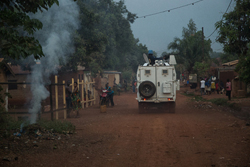
June 21 was an historic day for many victims of war in the Central African Republic (CAR). This was the day that the wheels of international justice, through the International Criminal Court, finally turned on Jean Pierre Bemba, the former vice-president of the Democratic Republic of the Congo, for the rape and pillage committed by his troops in CAR between 2002 and 2003. After 13 years, this judgment finally felt like something of a real victory for defenders of justice and other innocent Central Africans living under a climate of total impunity for perpetrators of atrocities.
However, since the end of 2012, far away from international courts, hundreds of thousands of Central Africans have been living the horror of what has been described as the worst crisis in CAR’s history. In 2013, thousands of ex-Séléka rebels took control of the entire country. Among their leaders, many were ‘ex-liberators’ who were fought in the same war in 2002-2003 as Bemba but who were never held accountable for the crimes they perpetrated with their troops. In the recent crisis, these same leaders recruited foreign mercenaries from Chad and Darfur, and these mercenaries again committed their share of atrocities. At the end of 2013, militias known as Anti-Balaka emerged in retaliation against the ex-Séléka abuses. What was initially a conflict between two well defined rival groups, became a civil war that led to ethnic cleansing against the Muslim population of CAR.
In 2016, although there has been hope that the electoral process that concluded with the election of now-President Touadera in March would be a solution to the crisis, rampant impunity and the recent outbreak of violence remind us that the crisis is deep and many obstacles subsist to build a sustainable peace.
The country remains in the hands of predatory armed militias
Since June 19, a fresh wave of violence has been reported in rural areas of CAR, as well as in the capital Bangui, leaving dozens of people killed and thousands fleeing the attacks. According to a UN expert, military commanders continue to compete for the control of territory linked up with economic resources, particularly by extorting money from cattle owners. In some areas, active armed groups have made opportunistic alliances, while in other areas, old rivalries remain. Since 2014, former ex-Séléka factions have grown and have become stronger than they initially were. According to a UN expert, this is “a failure of the international response to the CAR crisis.”
In the south east of the country, LRA militias have intensified attacks and abductions that are generating a climate of terror, alongside the presence of heavily armed Sudanese poachers. The possible withdrawal of Ugandan troops installed in southeast CAR could aggravate the security situation in these regions.
Therefore, the situation where most of CAR’s territory is ruled by predatory, rent-seeking armed militias feeding on insecurity continues to be a reality in 2016.
Rampant impunity and predation undermine peace efforts
In 2015, the transitional government led by Catherine Samba Panza announced the creation of a Special Criminal Court composed of national and international magistrates with the mandate to investigate and prosecute war crimes and crimes against humanity that have been committed in CAR since 2003. However, as of June 2016, this Court has still not been put in place and no international arrest warrants have been issued by the International Criminal Court.
As violence spreads once again in CAR, the fight against impunity should remain one of the top priorities of the new CAR government and the international community. Failure to hold accountable those most responsible for the violence is a mistake that has proved to be not only inefficient but terribly dangerous in the long term. A fair and transparent system of justice is crucial and must be a condition for reconciliation and reconstruction in the country.
Photo: Bangui, February 2015. UN Photo/Nektarios Markogiannis.

